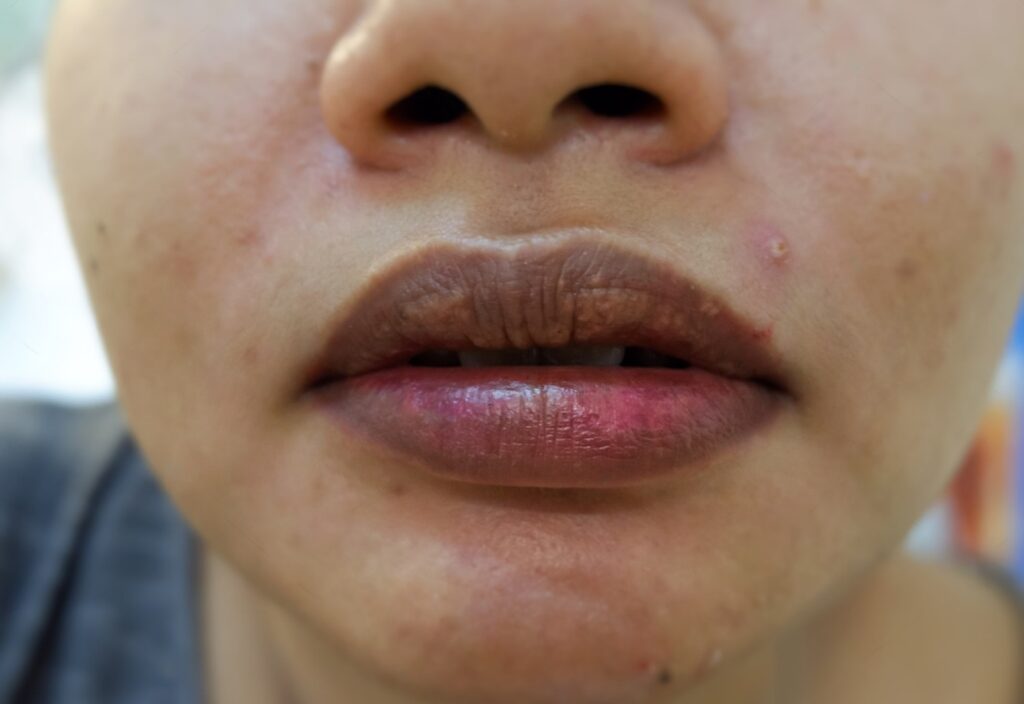
Lip pigmentation is a widespread concern characterized by the darkening of the lips due to increased melanin production. This condition can affect self-confidence, especially for those who prefer a more uniform and natural lip color. Fortunately, several treatments are available to address excess melanin and support skin regeneration on the lips. In this blog, we’ll explore the science behind these treatments, detailing how they work to lighten darkened lips and enhance their overall appearance.
Causes of Lip Pigmentation
Before discussing the treatments, it’s important to understand what causes lip pigmentation. The darkening of lips occurs when melanocytes, the cells responsible for producing melanin, become overactive. Several factors can trigger this overproduction:
- Sun Exposure: Extended exposure to UV rays can stimulate melanin production, leading to darker lips.
- Smoking: The chemicals in cigarettes, particularly nicotine and tar, can cause lips to darken over time.
- Genetics: Some people are genetically predisposed to having darker lips.
- Hormonal Changes: Hormonal fluctuations, such as those during pregnancy or from contraceptive use, can lead to lip pigmentation.
- Medications: Certain medications may cause hyperpigmentation as a side effect.
The Science Behind Lip Pigmentation Treatments
Lip pigmentation treatments are designed to reduce excess melanin and encourage the regeneration of healthy skin. Two of the most effective treatments include chemical peels and laser therapy.
Chemical Peel Treatment for Lip Pigmentation
A chemical peel involves applying a solution to the lips to exfoliate the top layer of skin, allowing new, healthier skin to emerge. Here’s how the process works:
- Exfoliation: The chemical solution, often containing acids like glycolic or salicylic acid, exfoliates dead skin cells and the outer layer of pigmented skin.
- Melanin Reduction: By removing the top layer of skin, chemical peels help decrease melanin levels in the lips, resulting in a lighter appearance.
- Skin Regeneration: Post-exfoliation, the skin regenerates, leaving behind softer, smoother lips with a more even tone.
Chemical peels are beneficial for targeting specific areas of pigmentation and promoting skin renewal. However, it’s crucial to select the appropriate peel based on your skin type and pigmentation level to avoid irritation from overly aggressive treatments.
Laser Treatment for Lip Pigmentation
Laser therapy is another effective option for reducing lip pigmentation. This treatment uses concentrated light energy to target and break down melanin in the lips. Here’s how it works:
- Melanin Absorption: The laser emits light energy that is absorbed by the melanin in the pigmented areas of the lips.
- Melanin Breakdown: The absorbed energy breaks down excess melanin, which is then naturally eliminated by the body’s lymphatic system.
- Skin Rejuvenation: As the melanin is broken down, the skin undergoes rejuvenation, resulting in a lighter and more even lip color.
Laser treatments are particularly effective for severe pigmentation, as they can target deeper layers of the skin. The benefits include precision, minimal recovery time, and lasting results. However, multiple sessions may be necessary to achieve the best outcome.
Precautions During Lip Pigmentation Treatments
When undergoing for lip pigmentation treatment, it’s important to take certain precautions to ensure the treatment is effective and your lips remain healthy.
First, protecting your lips from the sun is essential. UV rays can exacerbate pigmentation by increasing melanin production, leading to darker lips. To prevent this, consistently use a lip balm with high SPF, even indoors or on cloudy days, as UV rays can penetrate windows.
If you smoke, it’s advisable to quit or reduce your intake during treatment. Smoking introduces harmful chemicals that not only darken lips but also hinder the healing process, reducing the effectiveness of treatments. Additionally, maintaining a gentle skincare routine for your lips is crucial. Avoid harsh or abrasive products that could irritate the delicate skin, potentially worsening pigmentation or delaying recovery. Instead, use hydrating, soothing products that support healing and protect the skin barrier.
Staying hydrated is another key precaution. Well-hydrated skin heals more quickly and is less prone to irritation. Drinking plenty of water and using moisturizing lip products can support your skin’s natural regeneration process, enhancing the results of your treatment.
Conclusion
While lip pigmentation can be frustrating, effective treatments are available to restore your lips’ natural color and improve their appearance. Whether you opt for chemical peels or laser therapy, understanding the science behind these treatments can help you make an informed decision. By taking the right precautions, you can maintain the results and prevent further pigmentation.
